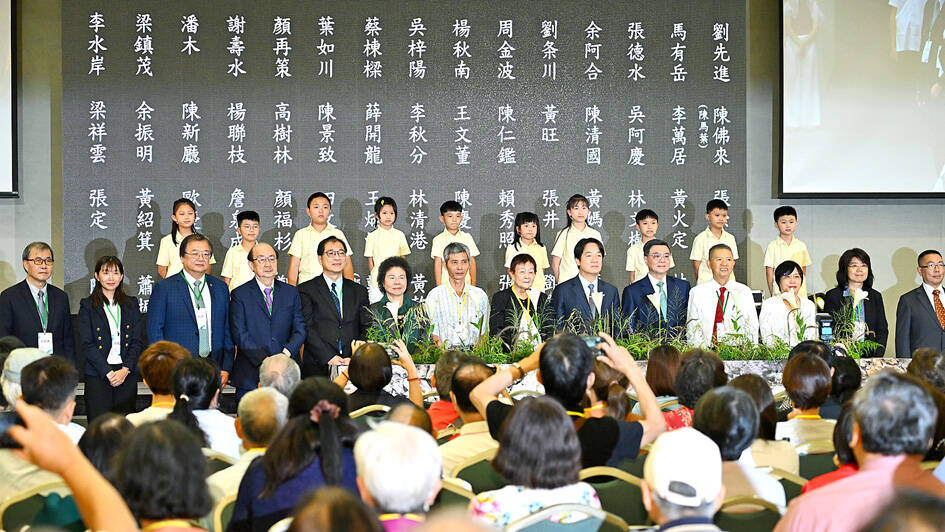The government’s transitional justice work would remain incomplete until the truth behind the murder of democracy campaigner Lin I-hsiung’s (林義雄) family in 1980 is uncovered, Control Yuan President Chen Chu (陳菊) said on Saturday.
Chen, who along with Lin was a key figure in the 1979 democracy demonstrations that later became known as the Kaohsiung Incident, urged the government to reinvestigate the case and the death of professor Chen Wen-chen (陳文成) one year later.
Both cases sent shock waves through society when the country was still under the rule of the authoritarian Chinese Nationalist Party (KMT) regime.

Photo: Chen Yi-kuan, Taipei Times
While lauding the government’s efforts to promote transitional justice over the past eight years, Chen Chu said that such work would remain “incomplete” if the two notorious cases remain unsolved.
Chen Chu, who is also head of the National Human Rights Commission under the government watchdog, added that the chances of solving the cases grow slimmer each passing day.
She made the comments at a historical political crimes exoneration event in Taipei attended by President William Lai (賴清德) and Premier Cho Jung-tai (卓榮泰).
In response to Chen Chu’s calls, Lai said it was the government’s responsibility to reveal the truth behind all “tragic incidents” during the White Terror era, a period of political repression in Taiwan carried out by the KMT from 1949 to 1987.
However, Lai did not lay out any concrete pathway to achieving that goal, saying only that the government would “continue to make every effort” on the matter.
Saturday’s event commemorated the exoneration of 2,579 victims of judicial and administrative wrongdoing during the period of authoritarian rule.
The Ministry of Justice approved the exonerations from October last year to June, the Restoration of Victim’s Rights Infringed by Illegal Acts of the State During the Period of Authoritarian Rule Foundation said.
The government has so far awarded NT$4.7 billion (US$147.15 million) in damages to victims, said the foundation, which was established in February last year after the dissolution of the Transitional Justice Commission.
On Feb. 28, 1980, while Lin, then a provincial councilor, was imprisoned for his involvement in the Kaohsiung Incident, his 60-year-old mother, Lin Yu A-mei (林游阿妹), and his seven-year-old twin daughters, Lin Liang-chun (林亮均) and Lin Ting-chun (林亭均), were stabbed to death in their home.
His eldest daughter, Lin Huan-chun (林奐均), who was then nine years old, survived with life-threatening injuries.
No perpetrators have been apprehended in the murders, and a report released by the Control Yuan in 2022 highlighted several major flaws in the investigation of the case by the Taiwan Garrison Command, a state security force that has since been disbanded.
As for Chen Wen-chen — a mathematics professor in the US, who had been active in promoting Taiwan’s democratic movement — a report issued by the commission in July 2021 suggested that the authorities might have killed him in Taiwan in 1981.
Chen Wen-chen was found dead outside the National Taiwan University library, shortly after arriving in Taiwan on a vacation from the US.
The day before he died, he was summoned by the Taiwan Garrison Command. His death, at the age of 31, is considered by many to have been a government reprisal for his activism abroad.

PRAISE: Japanese visitor Takashi Kubota said the Taiwanese temple architecture images showcased in the AI Art Gallery were the most impressive displays he saw Taiwan does not have an official pavilion at the World Expo in Osaka, Japan, because of its diplomatic predicament, but the government-backed Tech World pavilion is drawing interest with its unique recreations of works by Taiwanese artists. The pavilion features an artificial intelligence (AI)-based art gallery showcasing works of famous Taiwanese artists from the Japanese colonial period using innovative technologies. Among its main simulated displays are Eastern gouache paintings by Chen Chin (陳進), Lin Yu-shan (林玉山) and Kuo Hsueh-hu (郭雪湖), who were the three young Taiwanese painters selected for the East Asian Painting exhibition in 1927. Gouache is a water-based

Taiwan would welcome the return of Honduras as a diplomatic ally if its next president decides to make such a move, Minister of Foreign Affairs Lin Chia-lung (林佳龍) said yesterday. “Of course, we would welcome Honduras if they want to restore diplomatic ties with Taiwan after their elections,” Lin said at a meeting of the legislature’s Foreign Affairs and National Defense Committee, when asked to comment on statements made by two of the three Honduran presidential candidates during the presidential campaign in the Central American country. Taiwan is paying close attention to the region as a whole in the wake of a

A magnitude 4.1 earthquake struck eastern Taiwan's Hualien County at 2:23pm today, according to the Central Weather Administration (CWA). The epicenter of the temblor was 5.4 kilometers northeast of Hualien County Hall, at a depth of 34.9 km, according to the CWA. The earthquake's intensity, which gauges the actual effect of a temblor, was the highest in Hualien County, where it measured 2 on Taiwan's 7-tier intensity scale. The quake also measured an intensity of 1 in Yilan county, Taichung, Nantou County, Changhua County and Yunlin County, the CWA said. There were no immediate reports of damage or injuries.

OFF-TARGET: More than 30,000 participants were expected to take part in the Games next month, but only 6,550 foreign and 19,400 Taiwanese athletes have registered Taipei city councilors yesterday blasted the organizers of next month’s World Masters Games over sudden timetable and venue changes, which they said have caused thousands of participants to back out of the international sporting event, among other organizational issues. They also cited visa delays and political interference by China as reasons many foreign athletes are requesting refunds for the event, to be held from May 17 to 30. Jointly organized by the Taipei and New Taipei City governments, the games have been rocked by numerous controversies since preparations began in 2020. Taipei City Councilor Lin Yen-feng (林延鳳) said yesterday that new measures by